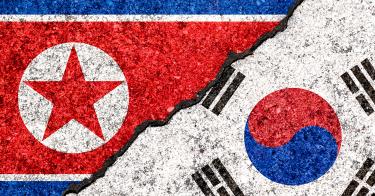Despite North Korea’s ongoing nuclear weapons buildup and provocations, South Korean President Moon Jae-in is trying to convince the United States to declare an end to the Korean War. While the 1950-53 war seems a relic of the past, North Korea today poses a very real security threat.
In his waning months in office, President Moon is increasingly desperate to jump-start dialogue with the recalcitrant Kim regime and secure his legacy as a peacemaker on the Korean Peninsula. President Biden should reject Mr. Moon’s entreaties while continuing to highlight the importance of the bilateral alliance to deter North Korean adventurism.
>>> North Korea Spikes Optimism on Inter-Korean Dialogue
Hampered by international sanctions from offering economic largesse to the North, Mr. Moon resurrected his peace proposal during a speech to the United Nations in September. He asserted that a declaration ending the Korean War would create “a new order of ‘reconciliation and cooperation’ on the Korean Peninsula [and] make irreversible progress in denuclearization.”
The Biden administration quietly rebuffed Seoul’s entreaties but was forced to disagree publicly after South Korean officials repeatedly announced Washington was on board and on the cusp of releasing a joint peace document. The U.S. correctly recognizes that a peace declaration should not be made as an upfront inducement simply to get Pyongyang back to the table. Any such declaration must come as part of a comprehensive denuclearization agreement.
North Korean officials quickly rejected Mr. Moon’s peace proposal as interesting but premature. Before considering Seoul’s conciliatory offering, Pyongyang demands significant concessions, including ending allied military exercises, reducing U.S. forces in South Korea and removing international sanctions. The regime has long emphasized that a peace declaration could “never be a bargaining chip” for getting its nuclear weapons.
A peace declaration would be a feel-good diplomatic gesture, an empty promise based on dangerous naïveté that did nothing to improve the security situation on the Korean Peninsula. It would only provide a vague hope of improving inter-Korean relations and persuading Pyongyang to less belligerent behavior.
There is a real downside, however, to this simplistic, non-binding diplomatic gesture. A peace declaration could have serious negative consequences for alliance security by creating a false sense of security. Declaring peace prior to addressing the real threat to peace—North Korea’s nuclear and conventional forces—could generate a domino-effect advocacy for prematurely reducing U.S. deterrence and defense capabilities that protect America’s allies in the region.
North Korea’s continued refusal to engage in dialogue should not induce the U.S. and South Korea to rush to yet another bad agreement with Pyongyang. The Korean landscape is already littered with the detritus of failed and broken pacts.
The Kim regime habitually violated the Korean War armistice, the 1991 inter-Korean pledge not to use force or armed aggression against each other, and numerous denuclearization agreements. That does not bode well for regime compliance to yet another agreement.
>>> Dealing With North Korea’s Dangerous Cyberthreat
In addition, the United States has provided non-hostility declarations and promises not to attack North Korea with either conventional or nuclear weapons. Those declarations had no impact on Pyongyang’s aggressive behavior or production of nuclear weapons. There is no evidence that a peace declaration would have any greater effect on North Korean behavior than those previous efforts.
A proper peace treaty ending the Korean War should instead require reduction and redeployment of North Korea’s massive array of artillery and maneuver units that are offensively deployed near South Korea. It also should include confidence-building and security-building measures, a comprehensive verification regime, and be conditioned on tangible progress toward North Korea denuclearization.
While the armistice provided the framework for peace, it has been the presence of strong South Korean and U.S. military forces that actually guaranteed the peace. Washington and Seoul should continue efforts at dialogue, but neither should risk degrading the shield which has protected America’s allies and strategic interests.
This piece originally appeared in The Washington Times



